How Much Does It Cost to Create an NFT Marketplace: Explanation and Practice
Updated 02 Mar 2023
15 Min
1312 Views
Decentralized finance (DeFi) and non-fungible tokens (NFT) are today’s tech industry’s most prosperous technologies. The potential of blockchain has resulted in significant growth of new projects based on solutions, as mentioned above, seeking to deploy their assets for further trading.
In terms of the current tendencies, the architecture of a special marketplace tailored to non-fungible token purchasing and sale is an on-demand platform that guarantees you stable profits on a long-term basis. However, the NFT marketplace development cost in 2022 is defined by a range of factors you should be aware of afore proceeding to the development flow.
Let's reveal the concept of NFT marketplaces and consider in detail the cost formation as well as monetization models that guarantee the profitability of such platforms for the long-term perspective.
Promising Niches for Using NFTs in Marketplaces
To begin with, it will be reasonable to give definitions of the basic concepts related to NFT and specialized platforms for their trading, as well as to characterize the basic principles of the operation.
NFT (non-fungible token) or non-interchangeable token stands for a blockchain registry entry that represents a real object.
What is a token? In simple terms, a token is a digitized and blockchain-based virtual unit that determines the possession of a certain digital asset. Let's take a practical illustration. An artist has created a digital picture and wants to confirm the ownership of this item by issuing a token. The term for this flow is tokenization.
What’s more, NFT ensures the opportunity to digitize any item, image, video, etc. In essence, we may describe this technology as a digital certificate that affirms the possession of a particular asset.
Evgeniy Altynpara
Chief Executive Officer and Founder at Cleveroad
To protect the significant investments in time and money made into developing unique assets, tech companies must have robust, comprehensive systems for protecting their IP- if not, the ROI on all their hard work may be significantly diminished (or lost altogether).
Talking about the difference between the NFT and a blockchain, the key peculiarity of the first solution lies in its uniqueness. Non-fungible tokens can’t be surrogated or replaced with any other digital asset, which excludes the interchangeability of this resource. This is conditioned by the original digital signature each object possesses. Consequently, non-fungible tokens are not identical to each other; they can’t be traded or exchanged on an equivalent basis/ used as a means of payment for trade transactions.
Grand view research claims that the global non-fungible token market value was equal to $15.54 billion in 2021 and is forecasted to increase at a compound annual growth rate (CAGR) of 33.9% within the following seven years. Aside from this, NFT trading volume is projected to rise to $82 billion by 2026. This progress may be attributed to the rising popularity of non-fungible tokens all around the world due to their indispensability, originality, and clarity valued and appreciated by users.
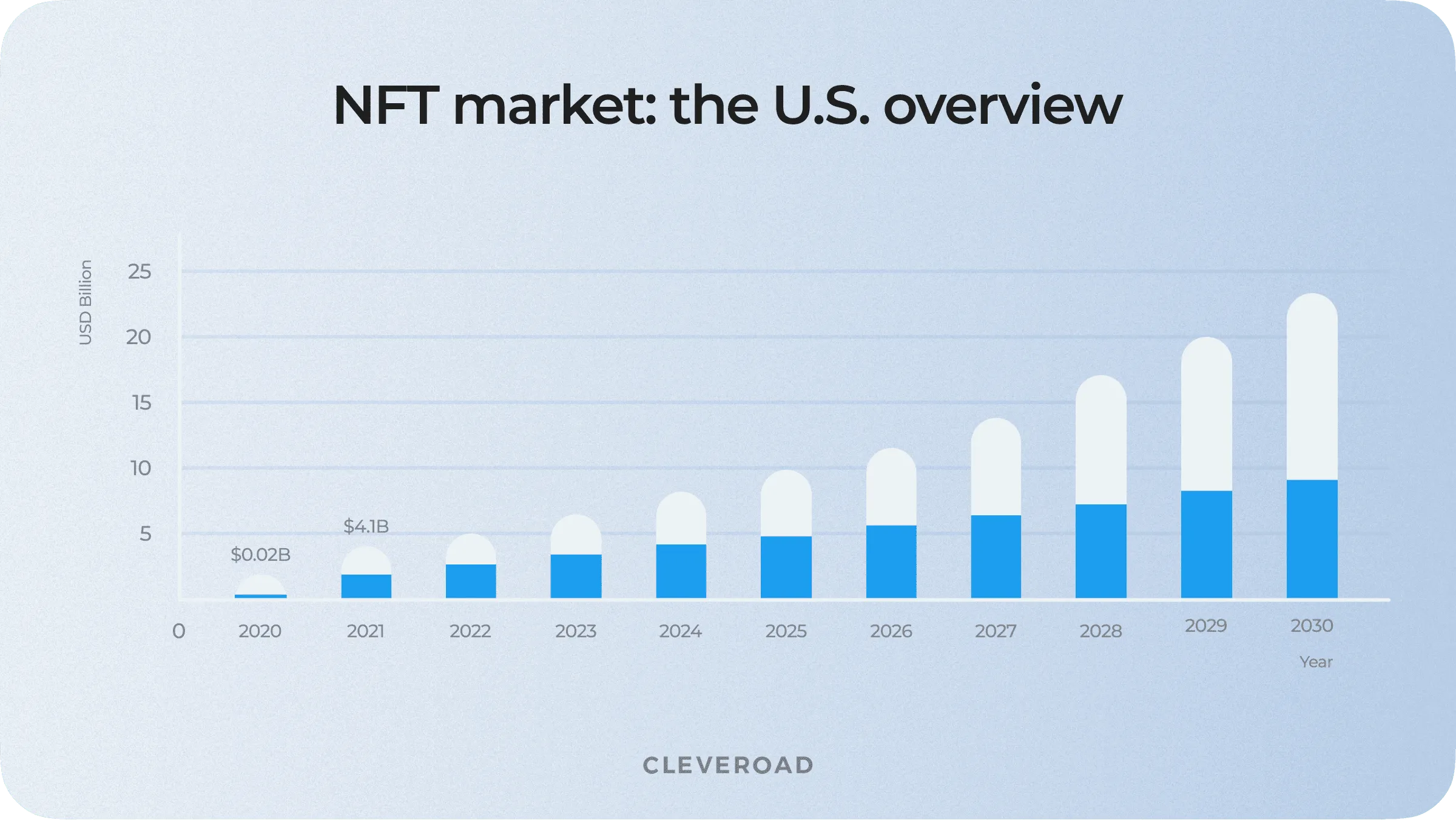
NFT market insights in the U.S.
In previous years and till the current moment, NFTs have gained improbable popularity. Currently, the number of NFTs located on the market has surmounted 1 billion, with an average of 8 million new items designed each month. The given insights are projected to keep rising since the number of users comprehending the NFT value and capacity grows as well.
NFT technology and its entire sector are currently in a phase of progressive growth. The two booming topics for the NFT purchase are the following:
- Arts and collectible NFT objects
- NFT-based games
The aforementioned successful insights demonstrate that NFT is actually an on-demand technology that may bring solid revenue. Needless to say that some items are more appealing to the purchasers, motivating them to invest significant finances for ownership confirmation. In contrast, other NFTs may be received for a much lower cost.
The principle of value formation in this market is pretty transparent; the price is set in accordance with the demand as well as the popularity of the digital object. As part of startups’ go-to-market strategies, a prevalent part of them adopts NFT marketplaces for digital products’ distribution.
NFT marketplace notion
NFT marketplace is a special trading platform tailored to non-exchangeable tokens buy-sell. Its functionality enables clients to purchase, sell, store and exchange tokenized immaterial assets. Basically, all these operations are performed with cryptocurrency: in the principal amount of cases, it is Ethereum (ETH). However, there’s a range of platforms supporting Bitcoin (BTC) or other cryptocurrencies and stablecoins for operations.
NFT objects can commonly be stored via the marketplace. Another option is to withdraw them on another cryptocurrency wallet. To illustrate, non-interchangeable tokens that are created complying with the Ethereum standard (e.g., ERC-721) can be kept in the official Ethereum wallet or other cryptocurrency wallets that are compatible with ERC tokens.
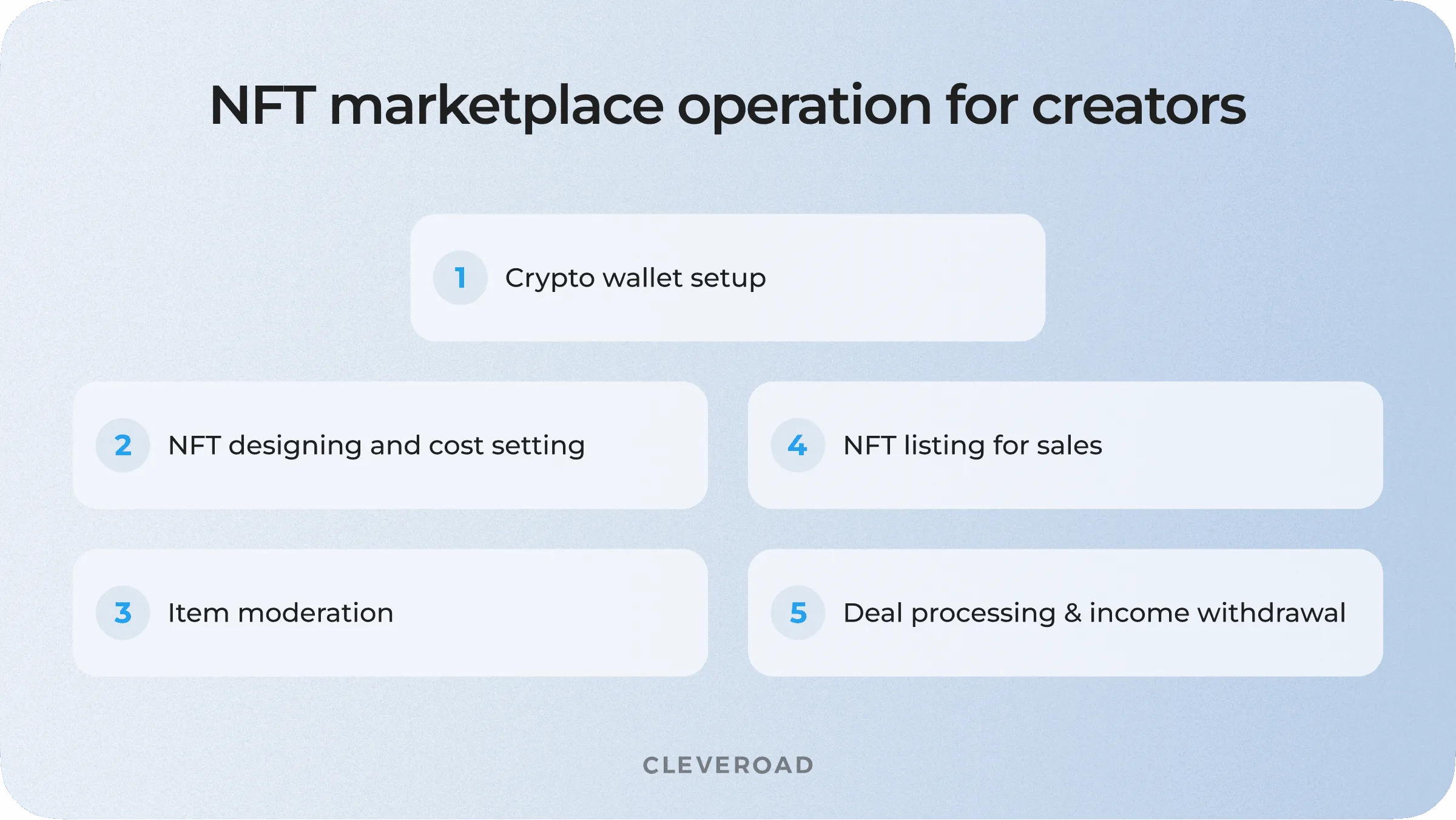
How NFT marketplaces work
We can also categorize NFT marketplaces according to the following characteristics:
By the level of restrictions on the objects’ placement:
- Open. Any customer is provided with an opportunity to place the NFT on the marketplace.
- Closed. Only specific persons can place tokens for sale (traditionally, we refer to the project team).
By the ownership type:
- General. This type was designed by a group of users and is open, without ownership by a specific organization.
- Private. Marketplaces that publish NFTs of a narrower focus, owned by a specific company.
By the type of objects that are posted on the site:
- No specific focus. NFTs for all preferences, tastes, and budgets, with no fixation on a specific theme.
- Thematic markets. In contrast to the previous type, such resources place NFTs exceptionally in a specific area, theme, or category.
- Moderated. Verification of published items, no content can be posted without administrators' approval.
Why the Creation of the NFT Marketplace Brings Value for Business
Which reasons will quickly recoup the cost of NFT marketplace development? They are as listed below:
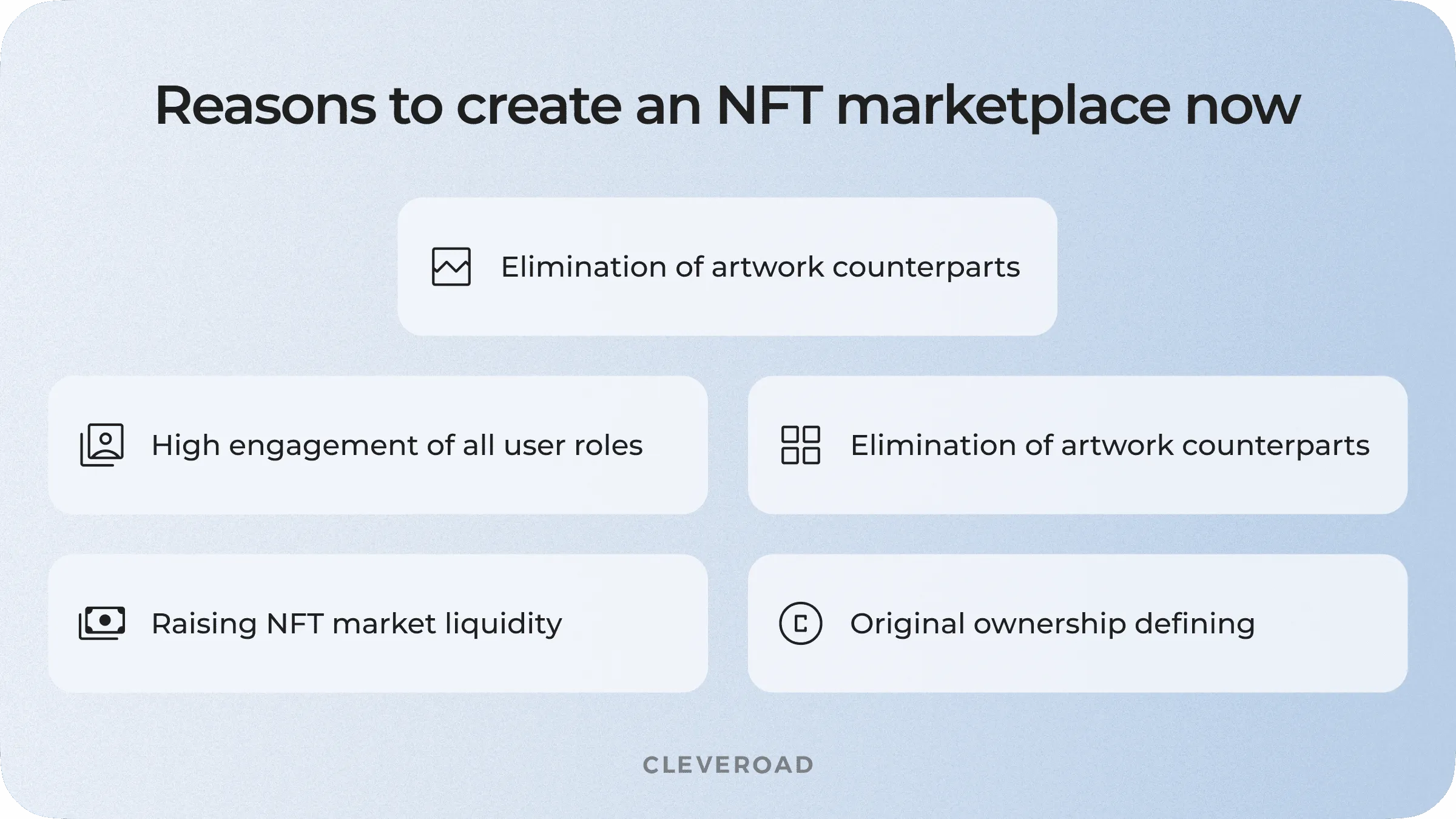
Why to create an NFT marketplace today
Now let’s disclose each factor in detail:
Solid income stream
The NFT is a relatively new and surely promising solution. The growing number of users engaged in collecting unique digital assets, as well as authors willing to place their items for sale in association, increases the demand for marketplaces for non-fungible tokens. The side of those wishing to buy and sell non-fungible tokens is united on one platform- the NFT marketplace, which serves as an intermediary.
Security and clarity
Due to the blockchain base, NFTs provide utter transparency, comprising all the activities performed in a distributed database that cannot be changed. Moreover, cryptography and consensus algorithms make all parties sure that the protection level is maximized. This peculiarity of NFTs liquidates risks and raises the reliability for the audience, raising the interest towards such platforms and the profitability accordingly.
Independence
NFT marketplace is a decentralized solution allowing the audience to perform buy-sell activities with no third parties in the form of financial establishments, banks, governors, etc. engaged. It is worth mentioning that this characteristic is also delivered by the blockchain.
Constant development
The market liquidity, as well as NFT demand, keeps its constant stable increase. Elimination of obligatory guidelines, as well as decentralized attributes of such platforms, motivates more and more individuals to invest in NFT purchases. Therefore, investing the cost to build NFT marketplace is beneficial for the market as a whole. These platforms increase its liquidity, which contributes to this sector’s development and penetration into the global economy.
What Is Included in the Cost of Creating an NFT Marketplace?
When choosing a development approach, you have two options: opt for the readymade solution as a basis for the platform implementation or design the one from scratch. The cost to build an NFT marketplace will be significantly lower than the expenses on the first model. However, the lack of customization, scalability, and flexibility in terms of available features’ range results in decreased customer experience and satisfaction rate.
There’s no universal template suitable for each project case - the from-scratch architecture always delivers higher rentability making your product more demanded due to the higher quality. Thus, despite the increased NFT marketplace development cost, the investments will return back to you rapidly due to the high user engagement. Besides, there’s no dependence on third-party development teams that operate the off-the-shelf solution chosen for the further platform architecture.
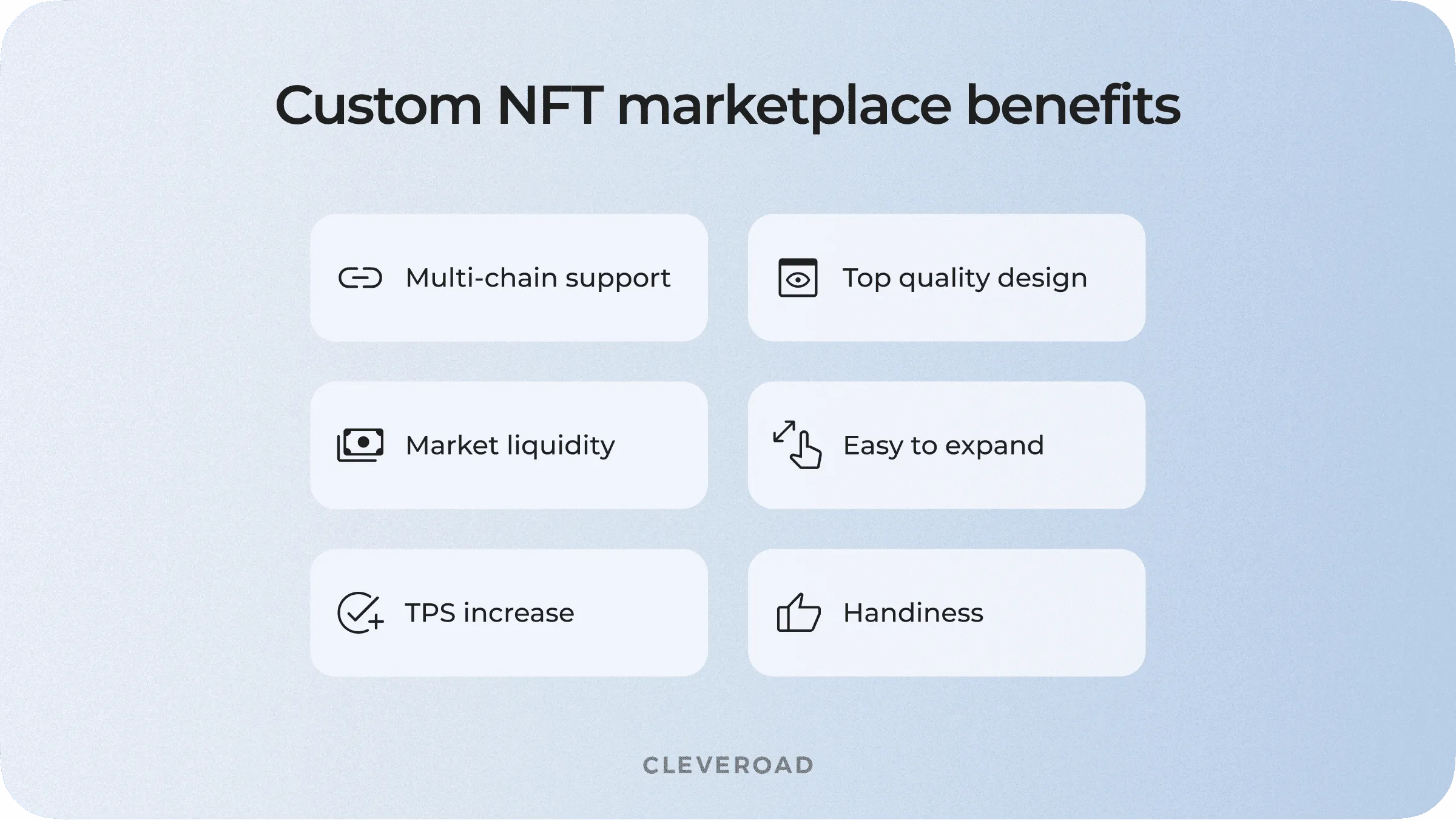
NFT marketplace from scratch profit
To formulate a more precise request to the IT vendor, we have listed the technical features and development tools for this type of digital solution. The range of the integral elements for the NFT marketplace implementation is the following:
- A marketplace platform traditionally exists as a web app where the audience offers and purchases NFTs. Due to this fact, it comprises two sides- client and server.
- A digital wallet is an online service for storing electronic funds.
- NFT metadata is the attributes of a digital asset offered as an NFT, particularly its denomination, design date, characteristics, holder, and more.
- IPFS (Interplanetary File System) is a data repository solution for distributed networks (blockchains). IPFSs are applied to liquidate force-expending keep of items with the metadata recorded via the blockchain.
- Smart contracts set an original designation for a separate NFT. For such platforms, the ERC-721 standard is basically leveraged to design NFTs. This aspect distinguishes fungible tokens from non-fungible ones.
- Blockchain is a decentralized database that records data concerning NFT operations.
It is also reasonable to get acquainted with a possible technical stack to apply as this point also determines how much does it cost to create an NFT marketplace:
- Golang is a solution efficient to architect solid and reliable products, specifically their backend.
- Solidity is a technology applied for smart contracts.
- LevelDB is a repository leveraged for rapid blockchain admission.
- AWS S3 is a cloud environment that delivers a row of accumulating digits for diverse capacities.
- Infura.io is a service ensuring connection with the Ethereum blockchain. Ethereum records the identifiers of digital assets and binds them to corresponding digital assets.
- ETH Gas Station delivers details concerning the fees of Ethereum operations.
- CoinMarketCap is a price-monitoring solution tailored to the crypto market.
What is the value of blockchain smart contracts? Find out in our article
Crucial functionality to architect for the NFT marketplace
Below you may find a list of integral features for the NFT marketplace. Traditionally, they are combined into functional groups or modules. Such a list is a key step to answering how much does it cost to build an NFT marketplace, as it should be considered separately within the frameworks of each case. Therefore, the following range mainly plays the role of a practical example for illustration purposes. It may serve as a base from which you can build on when discussing product implementation with your technical partner.
After implementing a basic functionality and deployment, you may expand your platform with advanced, unique features that will raise your trustworthiness and user satisfaction.
Customer roadmap
- Signing up/in. The registration and authorization process may be performed via traditional phone number/email and password or sign-in with existing social media accounts as well as digital wallets in case your platform provides support for such.
- Client profile. The part covers personal details, history of operations on the platform, and purchased NFTs.
- Storefront. This feature allows the placement and acquisition of non-fungible tokens.
- Items filtering. Users are able to search for NFTs by setting the specific filters (e.g., NFTs’ theme, cost, author, and other)
- NFT details and description. This section comprises the range of digital assets’ bids and ownership as well as the creator.
- Creator profile. In this section, authors can place their products for further trading, perform the NFT implementation flow, and track the previous deals and income obtained.
- Cost setting. Authors are allowed to set the fixed price for the NFT or opt for an auction.
- Fees for operations. Implementing a monetization model that requires a fee for each transaction.
- Royalty fee. A sum that is requested from the digital asset author each time the item is resold.
- Payment methods. Integration of the gateway that enables financial operations via an electronic or mobile wallet or a credit card.
Marketplace governance
- User operations. This feature enables tracking of the user processes executed on the NFT marketplace as well as their behavior.
- Product administration. A section devoted to adding, modifying, and deploying informational and advancement content.
- Trading management. Ensuring immediate generation of deals’ insights and platform revenue.
Cost to Build an NFT Marketplace: An Illustrative Breakdown
To get a more detailed estimate, it is necessary to consider in depth the list of the following aspects, according to which the final cost to develop NFT marketplace is set.
Team composition
A range of essential tech experts required for the NFT marketplace creation also depends on the project complexity, set deadlines, chosen development approach, and available financial resources. Here’s the potential list of experts required for the NFT marketplace implementation:
- Solution architect
- Project manager
- Business analysts
- UI/UX designers
- Software developers
- Quality Assurance engineers
Please remember that the list is approximate, and essential human resources range according to each standalone business case, impacting how much will nft marketplace development cost in 2022.
By splitting the NFT marketplace architecture into types of work and tasks, we may receive the following amount of hours:
| Type of work | Minimum time (h) | Maximum time (h) | Average time (h) |
Architecture | 900 | 1600 | 1300 |
UI/UX design | 180 | 220 | 200 |
Total | 1080 | 1820 | 1500 |
Tech partner’s rates
The critical factor within how much does NFT marketplace development cost in 2022 is the software development vendor’s region and rates. The table below reveals average pricing for technical services by leading global IT hubs:
| Specialist/Region | North America | Australia | Western Europe | Northern | Asia | South America |
Frontend developers | $70-$90 | $60-$75 | $60-$80 | $40-$55 | $35-$50 | $45-$70 |
Backend developers | $75-$95 | $75-$80 | $70-$85 | $40-$55 | $35-$55 | $45-$75 |
iOS developers | $80-$100 | $75-$90 | $75-$95 | $45-$70 | $40-$70 | $50-$80 |
Android developers | $80-$100 | $75-$90 | $75-$95 | $45-$70 | $40-$70 | $50-$80 |
UI/UX designers | $50-$70 | $50-$70 | $45-$60 | $35-$50 | $20-$49 | $45-$70 |
QA engineers | $50-$70 | $50-$70 | $45-$60 | $35-$50 | $20-$49 | $45-$70 |
DevOps engineers | $80-$100 | $75-$90 | $75-$95 | $45-$70 | $40-$70 | $50-$80 |
Drastically different costs may be confusing for startups. When it comes to IT outsourcing, performance quality and service price do not always depend on each other. According to the current market conditions, the most beneficial option in terms of value for money is Central and Northern Europe, especially Estonia. The vast pool of IT professionals from those regions will deliver a top-notch platform for NFT trading at an adequate cost, so we highly recommend starting to look for a software development partner there.
Wondering how much does it cost to build a blockchain NFT marketplace? Read our comprehensive guide explaining all price-driving factors
Other factors
- Functionality complexity and list of features
- Essential integrations required for the marketplace
- Technical stack leveraged for the architecture
- Testing, support, and maintenance expenses
The approximate cost of NFT marketplace development ranges between $100,000 and $500,000. Once again, it is vital to comprehend that each specific project should be considered separately, so the estimates above are delivered exceptionally for better guidance and practical demonstration of cost-determining factors.
NFT Marketplace Monetization Models
The most acute question within the NFT marketplace creation is the revenue stream. You may implement several models of monetization, which are described in this section.
Royalty
NFT marketplace traditionally charges a set commission on each non-fungible token selling and acquisition. This model is a really widely-applied one, yet very efficient.
Listing
The process of tokenization may also require a certain fee from the product’s author. To design an NFT as well as place it, creators should pay a specific sum.
Promotions
You may allocate a special space on the platform devoted to banners for marketing activities. NFT owners invest in advertisements to speed up the trading process and gain profits much quicker.
Bidding
Auctions performed on the NFT marketplace serve as one more option to monetize your platform. Therefore, it is reasonable to set a fee for each successfully accomplished NFT auction.
Read an in-depth guide on FinTech development app estimate
Today, there are already some prominent illustrations of such products. Here are the globally-demanded platforms for NFT trading:
Binance NFT marketplace
The world-famous service for cryptocurrency exchange and the leading platform in terms of trading volumes has made its contribution into the NFT sector enhancement. Binance NFT marketplace is tailored to non-fungible tokens featuring all categories of digital arts and collectibles.
OpenSea
OpenSea is a top NFT decentralized marketplace comprising a vast collection of items. It was the first platform for non-fungible tokens trading and, within the expansion, still remains the giant in the discussed sector. With OpenSea opportunities, users can explore and purchase unique digital assets.
As we may observe, NFT is a pretty profitable modern niche. A tailored marketplace unites both collectors and creators, boosting the non-fungible market and blockchain technology as a whole.
Making an NFT Marketplace: Cleveroad’s Experience
Cleveroad is a DeFi-experienced technical vendor from Estonia. We architect custom software for business streamlining in a great diversity of market domains. Our vast experience in the financial technology industry comprises designing turnkey web and mobile solutions for a range of needs.
Our from-scratch digital products are aimed at online payments processing, financial and banking reports, robust security, legal compliance, and data safety prioritization.
Cere Network NFT Marketplace
One of our successfully accomplished projects is the NFT marketplace based on Cere Network solutions. The requirement of our U.S.-based client was to architect the NFT marketplace to consolidate the experiences of buyers and artists in one utter platform.
Our key objectives were as follows:
- Design software allowing to choose, purchase, and trade non-fungible tokens with no third parties engaged
- Architect an interrelated program covering Cere Network solutions, media converter, and a fan platform to develop and offer NFT items
- Implement a monetization model based on financial transactions performed within the platform
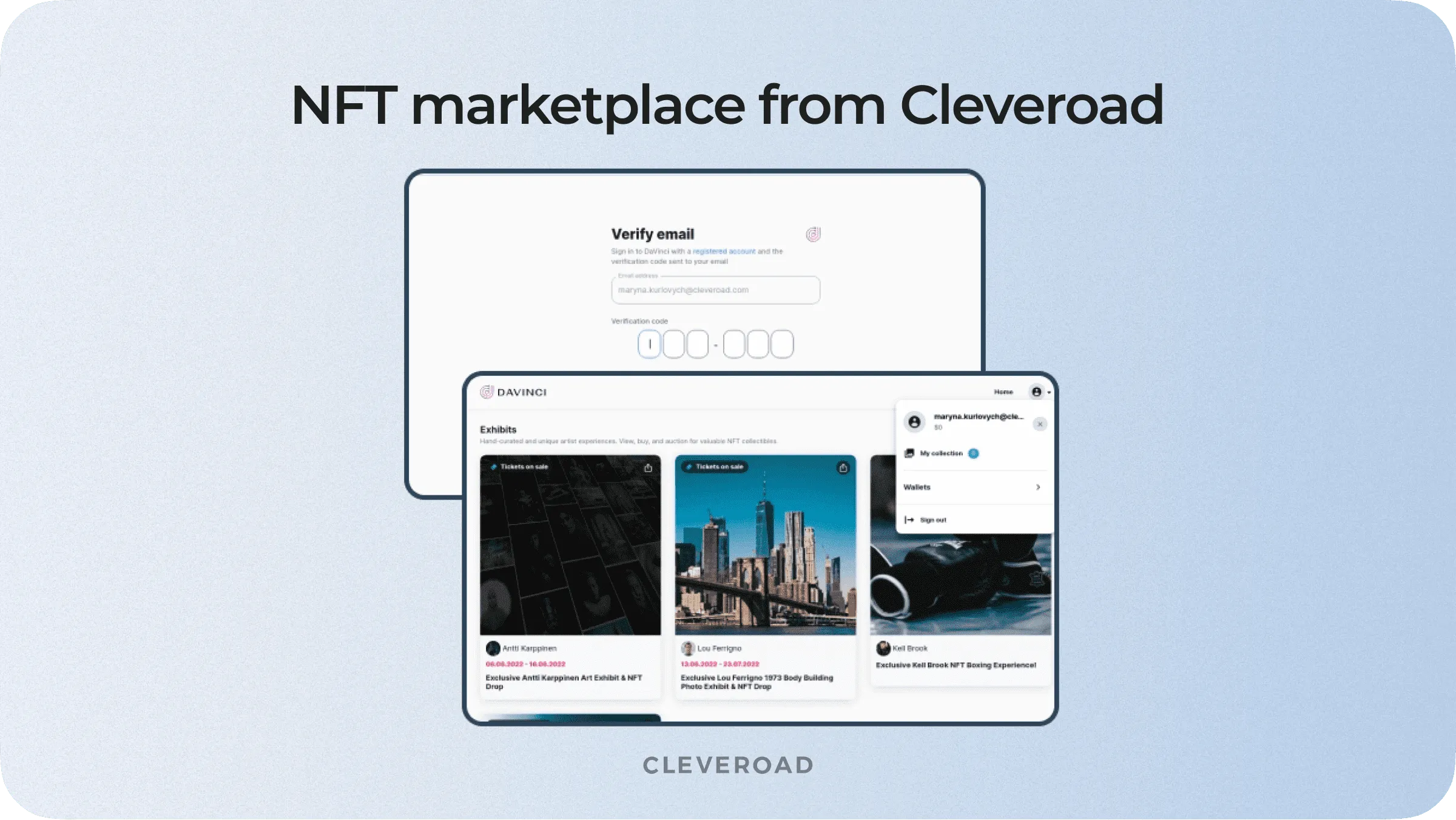
Cere Network NFT marketplace by Cleveroad
The cooperation result is a web product that unites parties engaged in NFT creating, collecting, and selling with the help of the video-on-demand solution. Focusing on security, we’ve integrated the existing Decentralized Data Cloud (DDC) for encrypted data distribution. Freeport CRM and payment gateway configuration were chosen for buy-sell execution, delivering seamless performance to each party of the deal.
Potential for capitalization growth, multifunctionality, and NFT community enhancement are the outcomes that substantially raise audience engagement and business rentability, respectively.
Cleveroad FinTech experts are ready to start the cooperation and architect the NFT marketplace complying with your business requirements.
Profit from booming NFT field
Create a new value stream by architecting a sought-after decentralized NFT platform with us
The approximate cost of NFT marketplace development ranges between $100,000 and $500,000. Once again, it is vital to comprehend that each specific project should be considered separately, so the estimates in this article are delivered exceptionally for better guidance and practical demonstration of cost-determining factors.
A range of essential tech experts required for the NFT marketplace creation also depends on the project complexity, set deadlines, chosen development approach, and available financial resources. Here’s the potential list of experts required for the NFT marketplace implementation:
- Solution architect
- Project manager
- Business analysts
- UI/UX designers
- Software developers
- Quality Assurance engineers
When choosing a development approach, you have two options: opt for the readymade solution as a basis for the platform implementation or design the one from scratch. The cost to build an NFT marketplace will be significantly lower than the first model. However, the lack of customization, scalability, and flexibility in terms of available features’ range results in decreased customer experience and satisfaction rate.
NFT (non-fungible token) or non-interchangeable token stands for a blockchain registry entry that represents a real object. What is a token? In simple terms, a token is a digitized and blockchain-based virtual unit that determines the possession of a certain digital asset. Let's take a practical illustration. An artist has created a digital picture and wants to confirm the ownership of this item by issuing a token. The term for this flow is tokenization.
Researchers claim that the global non-fungible token market value was equal to $15.54 billion in 2021 and is forecasted to increase at a compound annual growth rate (CAGR) of 33.9% within the following seven years. Aside from this, NFT trading volume is projected to rise to $82 billion by 2026. This progress may be attributed to the rising popularity of non-fungible tokens all around the world due to their indispensability, originality, and clarity valued and appreciated by users.
When it comes to IT outsourcing, performance quality and service price do not depend on each other. According to the current market conditions, the most beneficial option in terms of value for money is Central and Northern Europe, especially Estonia. The vast pool of IT professionals from those regions will deliver a top-notch platform for NFT trading at an adequate cost (with an average hourly rate equal to $50), so we highly recommend starting to look for a software development partner there.

Evgeniy Altynpara is a CTO and member of the Forbes Councils’ community of tech professionals. He is an expert in software development and technological entrepreneurship and has 10+years of experience in digital transformation consulting in Healthcare, FinTech, Supply Chain and Logistics
Give us your impressions about this article
Give us your impressions about this article
Comments
1 commentsgood article
